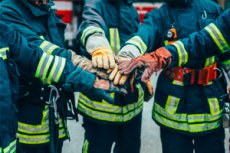Better nutrition helps firefighters fight cancer
Sist anmeldt: 14.06.2024

Alt iLive-innhold blir gjennomgått med medisin eller faktisk kontrollert for å sikre så mye faktuell nøyaktighet som mulig.
Vi har strenge retningslinjer for innkjøp og kun kobling til anerkjente medieområder, akademiske forskningsinstitusjoner og, når det er mulig, medisinsk peer-evaluerte studier. Merk at tallene i parenteser ([1], [2], etc.) er klikkbare koblinger til disse studiene.
Hvis du føler at noe av innholdet vårt er unøyaktig, utdatert eller ellers tvilsomt, velg det og trykk Ctrl + Enter.

Firefighters face a disproportionately high risk of developing various types of cancer (such as digestive and respiratory cancers) compared to the general population. Their experiences with cancer and their views on how much diet can help reduce their risk of cancer have been previously studied. These studies shed light on the relationship between dietary habits and cancer prevention awareness in the firefighter community. Understanding their perceptions may help develop targeted interventions to reduce cancer risks, focusing on the role of diet in cancer prevention among firefighters.
A recent article published in the Journal of Nutrition Education and Behavior examined American firefighters' understanding of the history of cancer, their attitudes toward cancer, and their views on diet as a cancer prevention measure.
Author Ashley Brown, Ph.D., RD, TSET Center for Health Promotion Research, Stevenson Cancer Center, University of Oklahoma, explained: “Given the association between diet and cancer risk, as well as cancer risk among firefighters, it is critically important understand how these risk factors can be mitigated through evidence-based interventions.”
The study used a mixed-methods cross-sectional design, recruiting participants through professional networks throughout the United States to recruit a national sample. The survey collected data on participants' cancer history and their perceptions of the role of nutrition in cancer prevention, using both quantitative and qualitative questions based on existing surveys and the Health Belief Model, a health prediction tool. p>
Data analysis included quantitative assessment using SPSS statistical software and qualitative content analysis aimed at understanding dietary changes to reduce cancer risk. A rigorous coding process was used to identify intervention strategies and nutrition-related factors. Specifically, qualitative responses were coded using the Behavior Change Techniques Taxonomy Version 1 (BCTTv1) to operationalize what firefighters reported wanting to change their diet into established evidence-based behavior change techniques to inform future interventions.
A total of 471 firefighters took part in the study. Nearly half (48.4%) strongly agreed that they were at risk of developing cancer, and 44.6% agreed that changing their diet could reduce their risk of cancer. The most common BCTTv1 codes were types of training including “instruction to perform the behavior” (45.1%, n = 189), followed by codes focused on performing the behavior (e.g., “planning activities” [24.8%, n = 104]). In the qualitative responses, many expressed concerns about misinformation and wanted to know exactly what level of risk reduction they could achieve by changing their diet. Many also expressed concerns about system-level barriers, such as food conditions at their fire stations.
The study suggests that in addition to macro- and micro-level changes in the food environment, firefighters express a desire to receive individualized support that addresses their specific risks and helps implement changes with the greatest potential to reduce cancer risk. The COVID-19 pandemic has heightened concerns about misinformation, including in nutrition-related areas, highlighting the need to provide reliable, specific information that can help make informed dietary decisions. Future research is encouraged to consider these findings when developing interventions targeting firefighters and to explore similar strategies for other tactical populations.
Dr Brown commented: “Consistent with previous research, we found that firefighters are aware of their increased risk of cancer and are willing to change their diet to maintain health. Although there was some doubt about the effect of diet on cancer risk, most participants without a history of cancer believed that changing their diet could reduce their cancer risk."
